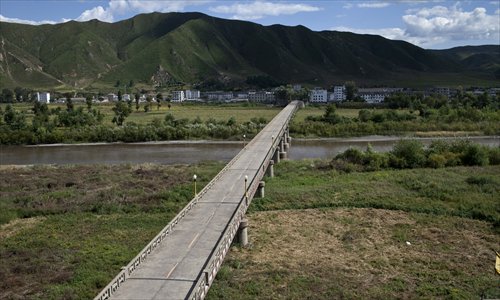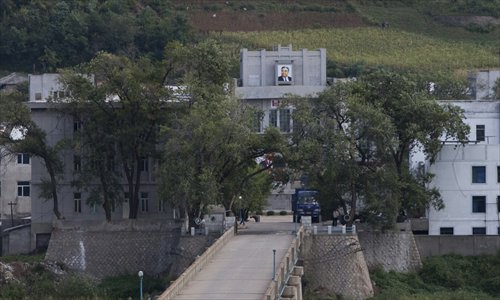Family ties endure across China-North Korea border
At the national level, how China deals with North Korean defectors is both a humanitarian and an international relations issue. But for ethnic Koreans living in China on the border, it is a question of family ties. In Yanbian, an ethnically Korean region on China's border with North Korea, many people have relatives on the other side of the border. But these relationships are frequently kept secret, as policies toward children of the defectors fluctuate with geopolitics and diplomatic ties between the two countries.

A bridge over Tumen River in Yanbian, Jilin Province, leads to North Korea. Photo: IC
The Tumen River, which divides China and North Korea, flows silently.
On one side of the river is the Yanbian Korean Autonomous Prefecture, with China's largest population of ethnic Korean citizens. Looking across to the other side, one can see the vast spaces of North Korea. At their closest, the two countries are only 50 meters apart, close enough to hear voices from the other side.
The relatively uninhabited and lightly-guarded areas of Tumen, a border region belonging to Yanbian Prefecture, used to be an important escape corridor for North Korean defectors. For North Korea watchers, these defections are a matter of Northeast Asian politics and humanitarian aid. But for ordinary people living on both sides of the border, they are a question of family ties.
Broken families
Since the division of Korea after World War II and the end of the Korean War, North Koreans have defected for a variety of reasons, with the number of defectors increasing greatly after the famines of the 1990s. Yanbian's close ties and geographic proximity to Korea has made it a common route for North Koreans crossing the border. Intermarriage is common; little wonder then that defectors are sometimes protected by ethnically Korean villagers on the Chinese side of the border.
There have been many instances where North Korean women who escaped to Yanbian married local ethnically Korean men and gave birth to children. However, once they were found by authorities they were sent back to North Korea, leaving behind their husband and child. In many cases, the child is raised by their father and paternal grandparents, kept completely in the dark about the maternal side of the family.
One woman surnamed Liang in her 50s from a village that borders North Korea told the Global Times that her village had children whose North Korean mothers were forced to go back. The fathers went to work in South Korea, leaving the children to the elder people in the family. Life is difficult for these children, but as time has gone on the local government has gradually loosened its control over residential registration, or hukou, allowing the children to go to school and have medical insurance. Last year, a radio station in Yanbian reported the children's stories and called for help from the public.
Zheng Jinnan has served in a village hospital near the border for 12 years. He told the Global Times that he knew of several children like this, not only in his village but also in villages nearby. He told the story of one 13-year-old boy that he had gotten to know when the boy came to the hospital accompanied by his father.
"I like the boy very much. He's a cute little guy, and very smart," the doctor said. "However, his grandfather died in 2011 and his grandmother died a year later, leaving only him and his father. People never talk about his mother in front of him. I feel sorry for him whenever I see him."
Both Liang and Zheng refused to lead the way to the boy's house, saying it's better not to visit the family. Zheng believes that the story of these children reveals two problems.
"The first is the marriage difficulties of Korean men in Yanbian. There are quite a lot of men in their 40s who are still single. It is difficult for them to find a wife. If they can marry North Korean women, it's not a bad option. The other problem concerns family relationships. It's heartless to separate a mother from her husband and kid. At the very least the child should be guaranteed a hukou and medical insurance, just like other children. The women should be given protection and the child needs the love of the mother."

A portrait of Kim Il-sung hangs on the North Korean side of a bridge over Tumen River, as seen from the Chinese side. Photo: IC
Divided hearts
Stories like Zheng's are hardly new. Cross-border family ties go back decades.
Many people of Korean ethnicity in Yanbian went to North Korea during the Cultural Revolution (1966-76), when inspections at the border were not particularly strict. During the early years of the Kim Il-sung era, living conditions in North Korea were somewhat better than in China.
Zheng's aunt was one of these. She married a North Korean man and had three children. In 2000, when North Korea was suffering from famine, she smuggled herself to Yanbian for a better life, staying with Zheng's family. She did part-time work to earn money, trying everything she could to send money back to her relatives in North Korea.
She stayed in Yanbian for seven years. But the strain of being separate from her family eventually got to be too much. So on one cold, dark night, she smuggled herself back to North Korea. At the beginning, Zheng got letters from her saying that she was being treated like a convict, being forced to undergo reform through labor. Every day she had to check in with authorities. Letters from her usually took months to reach the Chinese side. Gradually, Zheng's family lost touch with her.
"Once I got a letter from her inviting us to celebrate her birthday. But by the time we had gotten her letter, her birthday had already passed," the doctor said, shaking his head with a sigh.
"During my aunt's stay here, my father passed away. She helped my mother and me a lot, comforting us. I miss her a lot now, but it's been difficult to get back in touch. If she's still alive, she would be almost 70 years old. I hope she's living an easier life now."
Stories like these are not rare. Tragedy is the common thread running through them. Zhang Hongmei, 65, is a widow living alone in another village in Tumen. A decade ago, her North Korean niece was sold by Chinese North Koreans to Shandong Province and forced to marry a man with a sadomasochism fetish. Even when she left her home to go to work, her husband followed her. She called her aunt several times, asking the aunt to come rescue her.
"I was worried and scared. I couldn't help her because the situation was tough at that time. She would risk being sent back and I would be punished," Zhang said.
Luckily for the young woman, she managed to escape from her husband. She went to Guangxi Zhuang Autonomous Region with the help of human traffickers, and eventually made her way to South Korea in 2008.
"Now it's been six years. She has South Korean nationality now and calls me often. She told me she would come to see me soon," Zhang told the Global Times.
When the lady spoke, she kept her voice low, similar to Doctor Zheng. She was very calm when talking about her upcoming meeting with her niece, perhaps because she had gotten used to the separation. For years, she could not talk about it with outsiders, and had to keep the pain of missing her niece bound up inside of her.
Beyond geopolitics
Across China, there are many experts following closely Sino-North Korean relations, yet only a few have touched on the issue of North Korean defectors. Jin Qiangyi from Yanbian University is one of them.
He began to research North Korean defectors in 1996. He told the Global Times that the greatest number came to China between 1996 and 1998, during which time it was easy to spot them in areas close to the border. Nowadays there are fewer due to the tight border control by both the Chinese and North Korean sides.
One night he observed hundreds of North Koreans illegally crossing the Tumen River into China. Jin helped by providing food and money to some of them, even helping to find them shelter through a friend who ran a hotel at the time. Among those who he had helped, about 30 have escaped to South Korea.
"Those who were not found and managed to stay in China have become familiar with life here. Some villages protect them," Jin said.
Fluctuations in the bilateral relationship between China and North Korea over the past two years have called the "sealed in blood" nature of the China-North Korea relationship into question.
In August, a group of North Korean defectors were detained on the Chinese border with Laos, South Korea's Yonhap News Agency reported. Rather than returning them to North Korea, Chinese authorities returned them to the South, a move that was seen by some strategists as a shift in Beijing's policy toward Pyongyang. Jin Qiangyi believes it is because China is attaching more importance to its international image.
"China worries that the North Korean defector issue may affect its image on the global stage. Its consideration of relations with North Korea comes second," Jin said.
"China is right to believe that if it loosens control on these defectors and guarantees them refugee status, the Chinese border will be a mess. But it should take a better approach to the issue, both from the perspective of its rising influence and from a humanitarian perspective," he said. "For example, China may give special treatment to defectors like pregnant women and children."
If China cannot handle the issue well, the international community may step up its pressure as China is a signatory to the 1951 Refugee Convention, Jin added.
Yet for ordinary people, the topic of international relations is far removed from their daily lives. What they wish for is a reunion with far-away family members.
"North Korea is so closed-off. It should learn from China to open itself up," said Zheng Jinnan. "If China and North Korea are to develop their relations, people-to-people exchanges must be enhanced, especially for relatives on both sides. The tragedy of family separation should never happen again."
Newspaper headline: Between two worlds